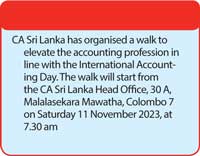Thursday Feb 19, 2026
Thursday Feb 19, 2026
Friday, 10 November 2023 00:20 - - {{hitsCtrl.values.hits}}

 Today, November 10 is International Accounting Day that commemorates the day in 1494, when Luca Bartolomeo de Pacioli, a Venitian mathematician, known as the Father of Accounting, published his book, Summa de arithmetica, geometria, proportioni et proportionalita the English translation of which is, ‘Everything about arithmetic, geometry and proportion’.
Today, November 10 is International Accounting Day that commemorates the day in 1494, when Luca Bartolomeo de Pacioli, a Venitian mathematician, known as the Father of Accounting, published his book, Summa de arithmetica, geometria, proportioni et proportionalita the English translation of which is, ‘Everything about arithmetic, geometry and proportion’.
Evidence of Accounting in ancient rock scripts
Although double entry bookkeeping was introduced by Luca Pacioli, the function of accounting is an age-old exercise in any civilized society. In Sri Lanka also there is evidence of the existence of accounting depicted in various rock scripts. One such rock script was the Mihintale Tablet erected by King Mahinda IV in tenth century AD. There were two tablets and the text dealt with the duties of the officers and the monks of the Sandagiri Monastery. The text goes on as follows from the lines 53 to 58 in the first tablet.
“Except the portion granted for their livelihood, the balance income tax, transacted with the concurrence of the officials, collected from lands belonging to this monastery shall be entered in the daily primary register. Whatever is spent daily on the maintenance of the Maha-Pavatta for the wage earners, and on the renovation of works shall be entered in the daily primary register. That should be signed by the chief officers and by the people authorised to sign. The daily primary registers should be placed in a casket under lock and key. A monthly statement should be prepared on the daily registers. From the twelve statements of accounts prepared for the year, an annual account statement should be compiled, and read out at a meeting of the monks and recorded in the secretarial book. The officers who do not follow these rules shall be made to pay gedad fines and be dismissed from service” (Translated from the Vimarsanathmaka Sinhala Shilalipi Mala by Ven. Makuruppe Dhammananda).
At that time, they had day books, monthly accounts and annual meetings at which the annual accounts were tabled and discussed. Accounting is the language of Business. Let alone monthly accounts, quite a number of small businesses today do not keep proper accounting records.
Eventually, in 1854, the Institution of Accountants in Glasgow became the first official organisation representing and regulating the accounting profession. The International Accounting Standards Committee (IASC) was formed in June 1973 in London through an agreement made by professional accountancy bodies from Australia, Canada, France, Germany, Japan, Mexico, the Netherlands, the United Kingdom and Ireland, and the United States of America. In April 2001, the International Accounting Standards Board (IASB) was formed replacing the IASC.
The International Federation of Accountants (IFAC) was founded in October 1977, in Munich, Germany, at the 11th World Congress of Accountants. The IFAC comprises 180 professional organisations in 135 jurisdictions.
Accounting bodies in Sri Lanka
In Sri Lanka we have three accounting bodies. The Institute of Chartered Accountants of Sri Lanka (CA Sri Lanka), the premier accounting body in the country, was founded in 1959 by Parliamentary Act No. 23 of 1959. In terms of the Sri Lanka Accounting & Auditing Standards Act No.15 of 1995, CA Sri Lanka is authorised to set the Accounting and Auditing Standards in the country. Sri Lanka Accounting Standards are based on the International Financial Reporting Standards issued by the International Accounting Standards Board (IASB). Sri Lanka Auditing Standards are based on the International Standards on Auditing (ISA) published by the International Auditing Practices Committee (IAPC) of the IFAC.
The Institute of Certified Management Accountants of Sri Lanka (CMA) was established by Parliamentary Act No 23 of 2009. It was initially established in June 2000 as the Society of Management Accountants in Sri Lanka.
The Association of Accounting Technicians of Sri Lanka (AAT Sri Lanka) was formed in 1987 and registered under the Companies Act No 17 of 1982 and re-registered under the new Companies Act No 7 of 2007, as a company limited by guarantee.
The Association of Public Finance Accountants of Sri Lanka (APFASL) was established in January 2012 as the Public Sector Wing of CA Sri Lanka, with the primary objective of enhancing professional skills and expertise of public sector accountants, auditors and assessors in order to improve financial management practices in the country.
Public Accountants (Auditors who are hartered Accountants) unlike in other professions where professional responsibility lies with the client, are responsible for the public at large who rely on the Financial Statements audited by them. Therefore, integrity is an essential part of their profession. Besides the Public Accountants, Chartered Accountants, Management Accountants, Public Sector Accountants and Accountant Technicians who render their services in private or public organisations too should adhere to the best levels of integrity.
Sri Lanka is in a financial crisis today and a country that has declared bankruptcy, acknowledging that it is unable to pay its sovereign debts. We are currently under the IMF program of assistance. We know that Sri Lanka is falling behind in its commitments given to the IMF and the second instalment of the loan is delayed. Meanwhile, the IMF issued a report at the end of September emphasising 16 points associated mainly with corruption and governance issues. While acknowledging the fact that accountants cannot contribute to solve all these issues, the accountants can contribute immensely to eradicate corruption in the country.
 Therefore, my first suggestion to the three accounting bodies of Sri Lanka and to the universities that teach accounting, is to find out a way of inculcating integrity in the accounting students as it is crucial not only to the profession but also to the country. The process should be in the curricula and introduced as a way of life.
Therefore, my first suggestion to the three accounting bodies of Sri Lanka and to the universities that teach accounting, is to find out a way of inculcating integrity in the accounting students as it is crucial not only to the profession but also to the country. The process should be in the curricula and introduced as a way of life.
Sri Lanka in contrast to western cultures is not a rules-based society. Things are done based on social connections. Therefore, society is vulnerable to move towards corruption and bribery. I do not suggest that corruption is not found in western cultures. The biggest white-collar scandals happened in the West but their vulnerability to corruption as a society is low. Hence, we have to make extra effort to combat this vulnerability.
All three accounting bodies of Sri Lanka are members of the Confederation of Asian and Pacific Accountants (CAPA); and CA Sri Lanka and CMA are members of South Asian Federation of Accountants (SAFA). Sri Lanka has produced two past presidents of CAPA, Ranel T. Wijesinha and Sujeewa Mudalige and six past presidents of SAFA, Lakshman R. Watawala, N.A.L. Cabraal, Lal Nanayakkara, Indrajith Fernando, Arjuna Herath and H.M.Hennayake Bandara. The current Vice President of CA Sri Lanka Heshana Kuruppu is the current Vice President of SAFA as well.
In other countries there are accounting associations. The American Accounting Association (AAA) is an organisation that supports accounting education, research, and practice. It is the primary professional association for accounting academics in the United States. The Indian Accounting Association (IAA) is an interface between academics, professionals and practitioners from various universities, businesses, industry and government. The main function of IAA is to promote and disseminate knowledge of accounting and related subjects in India and abroad.
Both CA Sri Lanka and CMA have signed MOUs with the accounting departments of various Sri Lankan universities. It is the time now to take a step forward and establish an association comprising professional accounting bodies and accounting departments of the Sri Lankan universities. This is a necessary combination considering the present status of Sri Lanka.
Accounting Standards
For instance, CA Sri Lanka is setting the Accounting Standards. In addition to the main set of standards they have prepared a set for SMEs and another for micro entities. The country needs to carry out extensive research by the academics, to ascertain whether businesses apply these standards. The feedback would be helpful for standard setters. The intention of both, professionals and academics should be to promote the application of accounting knowledge in the businesses. In order to revive our collapsed economy, the contribution of the SMEs is essential not only in the Western Province but throughout the country. Most of these entities are collapsing due to lack of financial literacy.
Hence, my second suggestion to the accounting bodies and the academic institutions in accounting is to get together in the form of an association and make a combined effort to promote accounting knowledge and financial literacy in the country.
CA Sri Lanka has organised a walk to elevate the accounting profession in line with the International Accounting Day. The walk will start from the CA Sri Lanka Head Office, 30 A, Malalasekara Mawatha, Colombo 7 on Saturday 11 November 2023, at 7.30 am.